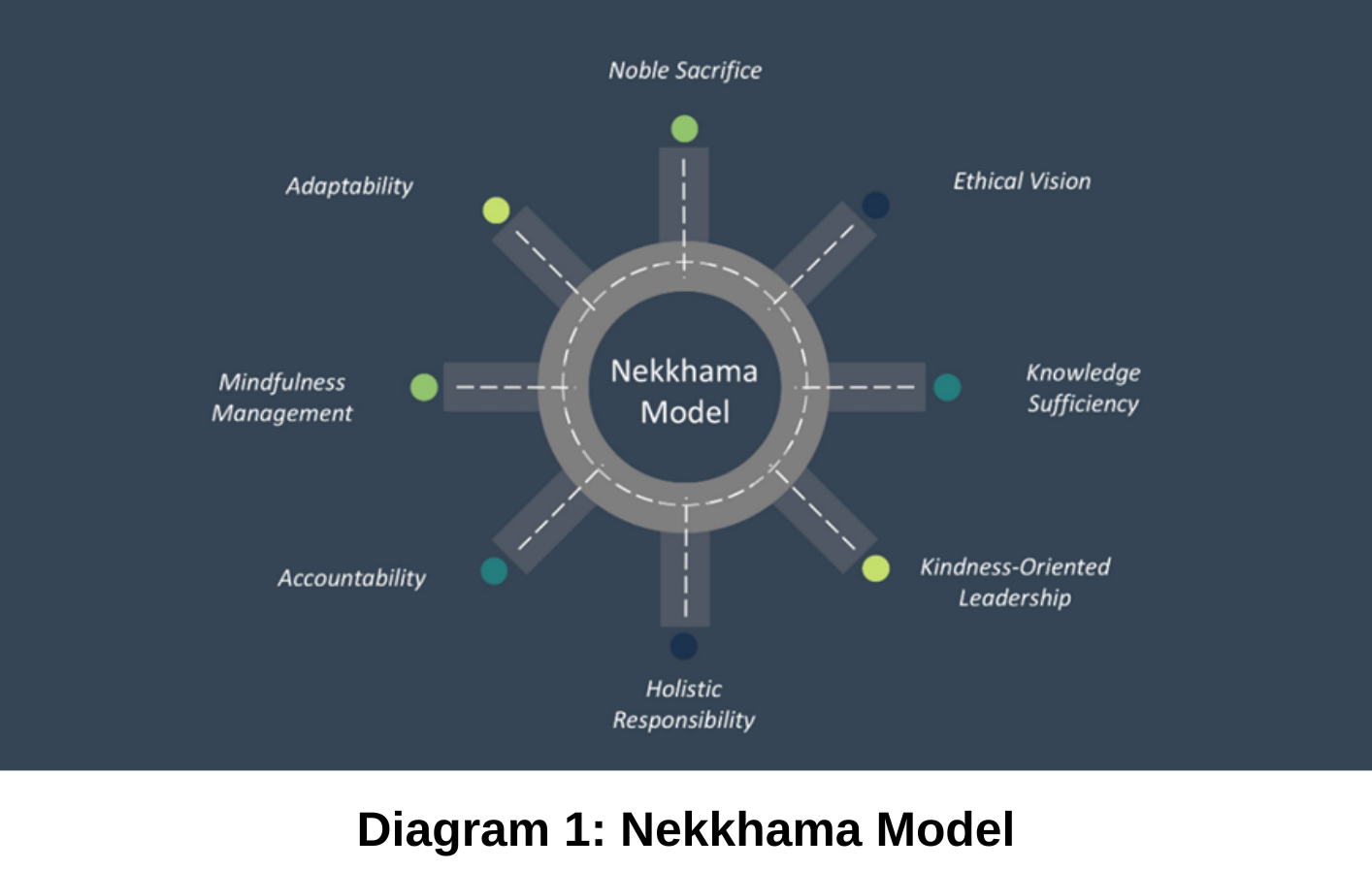Business Administration Based on the Practice of Nekkhama Parami
Keywords:
Business, Administration, Business Administration, Nekkhama ParamiAbstract
This study aimed to examine and propose a conceptual framework for business administration based on “Nekkhama Paramī,” one of the ten perfections in the Theravada Buddhist tradition. Nekkhama Parami referred to the renunciation of attachment to material possessions and worldly pleasures in pursuit of peace and wisdom. The research analyzed the meaning, levels, and applications of Nekkhama Parami in the context of contemporary business administration, as well as its connections to modern management concepts. The findings suggested that applying Nekkhama Parami to business administration could help organizations reduce short-term greed-driven decision-making, enhance credibility, and create a balance among economic, social, and environmental dimensions. The success of such application depended on translating the principles into policies and operational processes aligned with the organization’s and market’s contexts. This research thus bridged Buddhist wisdom with modern management science to provide a sustainable and ethical approach to business administration.
References
จุลศักดิ์ ชาญณรงค์. (2566). การสร้างบุญบารมีตามหลักธรรมในพระพุทธศาสนาสำหรับสังคมผู้สูงอายุ. วารสารสังคมศาสตร์ มศว, 26(1), 13–29.
พระกวีวงศ์ (อิ่ม สารโท). (2556). ธรรมสมังคีของทศบารมีเป็นปัจจัยเกื้อหนุนในการตรัสรู้และการบำเพ็ญพุทธกิจของพระพุทธเจ้า. วิทยานิพนธ์พุทธศาสตรดุษฎีบัณฑิต. บัณฑิตวิทยาลัย : มหาวิทยาลัยมหาจุฬาลงกรณราชวิทยาลัย.
มนัญวดี สูนานนท์. (2556). การศึกษารูปแบบและกลยุทธ์ของการทำธุรกิจแฟรนไชส์อาหารในประเทศไทย. มหาวิทยาลัยมหิดล.
ราชบัณฑิตยสถาน. (2556). พจนานุกรมฉบับราชบัณฑิตยสถาน พ.ศ. 2554 : เฉลิมพระเกียรติพระบาทสมเด็จพระเจ้าอยู่หัวเนื่องในโอกาสพระราชพิธีมหามงคลเฉลิมพระชนมพรรษา 7 รอบ 5 ธันวาคม 2554. กรุงเทพฯ: ราชบัณฑิตยสถาน.
สำนักงานคณะกรรมการกำกับหลักทรัพย์และตลาดหลักทรัพย์. (2568). หลักการกำกับดูแลกิจการที่ดีสำหรับบริษัทจดทะเบียน : บทนำ (CG Code Introduction). แหล่งที่มา : https://www.sec.or.th/cgthailand/TH/pages/cgcode/cgcodeintroduction.aspx [13 สิงหาคม 2568].
สำนักงานคณะกรรมการพัฒนาการเศรษฐกิจและสังคมแห่งชาติ. (2546.) กรอบแนวคิดทางทฤษฎีเศรษฐศาสตร์ ปรัชญาของเศรษฐกิจพอเพียง. กรุงเทพฯ. สำนักงานคณะกรรมการพัฒนาการเศรษฐกิจและสังคมแห่งชาติ.
เอกชัย อุไรสินธ์. (2564). แนวปฏิบัติตามปฏิปทาของพระโพธิสัตว์ในสังคมไทยปัจจุบัน. มหาวิทยาลัยธรรมศาสตร์.
Buddhist Publication Society. (1982). Buddhist Stories from the Dhammapada Commentary: Part I (E. W. Burlingame, Trans.; B. Khantipalo, Selected & Revised). Kandy, Sri Lanka: Buddhist Publication Society.
Drucker, P. F. (1973). Managing the Public Service Institution. The Public Interest, 33(1), 43.
Elkington, J. (1998). Cannibals with forks: The triple bottom line of 21st century business. Oxford, UK: Capstone.
Fayol, H. (1949). General and industrial management. London, UK: Pitman.
Fiedler, F. E. (1967). A theory of leadership effectiveness. New York, NY: McGraw-Hill.
Hillier, F. S., & Lieberman, G. J. (2021). Introduction to operations research (11th ed.). New York, NY: McGraw-Hill Education.
Kast, F. E., & Rosenzweig, J. E. (1972). General systems theory: Applications for organization and management. Academy of Management Journal, 15(4), 447–465. https://doi.org/10.5465/255141
Koontz, H., & Weihrich, H. (2010). Essentials of management: An international perspective (9th ed.). New Delhi, India: McGraw-Hill Education.
Maslow, A. H. (1943). A theory of human motivation. Psychological Review, 50(4), 370–396.
Mayo, E. (1933). The human problems of an industrial civilization. New York, NY: Macmillan.
Payutto, P. A. (1994). Buddhist Economics: A Middle Way for the Market Place. Buddhadhamma Foundation.
Porter, M. E. (1985). Competitive advantage: Creating and sustaining superior performance. New York, NY: Free Press.
Porter, M. E., & Kramer, M. R. (2011). Creating shared value. Harvard Business Review, 89(1–2), 62–77.
Robbins, S. P., & Coulter, M. (2018). Management (14th ed.). Boston, MA: Pearson.
Robbins, S. P., & Judge, T. A. (2019). Organizational behavior (18th ed.). Boston, MA: Pearson.
Taylor, F. W. (1911). The principles of scientific management. New York, NY: Harper & Brothers.
Westerman, G., Bonnet, D., & McAfee, A. (2014). Leading digital: Turning technology into business transformation. Boston, MA: Harvard Business Review Press.

Downloads
Published
How to Cite
Issue
Section
License
Copyright (c) 2025 Institute of Sufficiency Journal

This work is licensed under a Creative Commons Attribution-NonCommercial-NoDerivatives 4.0 International License.



